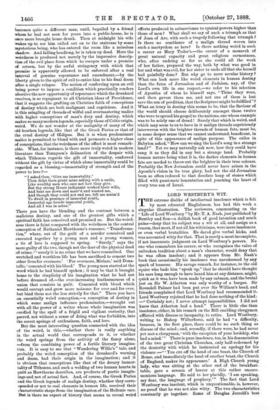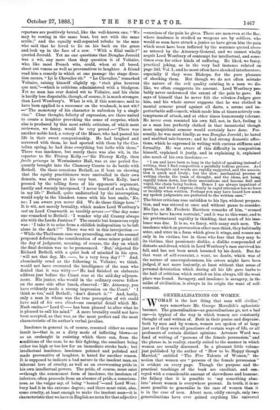LORD WESTBURY'S WIT.
MITE extreme dislike of intellectual insolence which is felt 1 by most educated Englishmen, has had this week a singular illustration. The reviewers, commenting on the "Life of Lord Westbury "by Mr. T. A. Nash, just published by Bentley and Son—a dullish book of good intention and much pains—deny that its subject was a wit at all, and assign as a reason, that most, if not all his witticisms, were mere insolences or even verbal brutalities. He dared give verbal kicks, and was accounted witty for that. That is surely a most incomplete, if not inaccurate judgment on Lord Westbtuy's powers. No one who remembers his career, or who recognises the value of unbroken tradition about a man's character, would deny that he was often insolent; and it appears from Mr. Nash's book that occasionally his insolence was unredeemed by any spark of humour. His savage remark, for instance, to the old squire who bade him "speak up," that he should have thought his ears long enough to have heard him at any distance, might, quick as it was, have been made by any cabman, and the brutal jest on Sir W. Atherton was only worthy of a bargee. Sir Roundell Palmer had been put over Sir William's head, and friends complained that Lord Westbury had recommended it. Lord Westbury rejoined that he had done nothing of the kind: —" Certainly not ; I never attempt impossibilities. I did not know that Atherton had a head." There is little else than insolence, either, in his remark on the Bill enabling clergymen afflicted with disease or incapacity, to retire. Lord Westbury, writing to Bishop Wilberforce, said he had "a difficulty, because, in the first place, there could be no such thing as disease of the mind; and, secondly, if there were, he had never yet met a clergyman, with the exception of your lordship, who had a mind." There is pure insolence, too, in his denunciation of the two great Christian Churches, only half-redeemed by the dexterity with which he insinuated an apology for his violence :--" Yon cut off the head of one beast, the Church of Rome, and immediately the head of another beast, the Church of Falgland, makes its appearance.' A High Church young lady, who was sitting at the other end of the breakfast- table, gave a scream of horror at this rather uncere- monious language. He said to her placidly, I am speaking, my dear, the language of prophecy.'" The fact that Lord Westbury was insolent, which is unquestionable, is, however, no proof that he was not also witty. The two characteristics constantly go together. Some of Douglas Jerrold's best repartees are positively brutal, like the well-known one, "We may be rowing in the same boat, but not with the same sculls ;" and the equally well-repeated rebuke to the man who said that he loved to lie on his back on the grass and look up in the face of a cow. "With a filial smile ?" queried Jerrold. Yet no one questions that Douglas Jerrold was a wit, any more than they question it of Voltaire, who, like most French wits, could, when at all bored, shoot out venom as well as provocatives to laughter. A friend read him a comedy in which at one passage the stage direc- tion occurs, " Ici le Chevalier nt." "Le Chevalier," remarked Voltaire, raising himself slightly up, " etait plus heureux pie moi,"—which is criticism administered with a bludgeon. -Yet no man has ever denied wit to Voltaire, and his claim is hardly less disputable, though, of course, it is much stronger, than Lord Westbury's. What is wit, if this sentence, said to have been applied to a successor on the woolsack, is not wit? —" The monotony of his character is unbroken by a single vice." Clear thought, felicity of expression, are there united to create a laughter provoking the sense of surprise, which also is produced by this most subtle criticism, of which most reviewers, we fancy, would be very proud :--" There was another noble lord, a votary of the Muses, who had passed his life in their sweet companionship. He had laughed and sorrowed with them, he had sported with them by the Gas- ton= spring, he had done everything but bathe with them." There was insolence, but surely there was also wit, in the repartee to Sir Fitzroy Kelly:—" Sir Fitzroy Kelly, then facile princeps in Westminster Hall, was at one period fre- quently brought into the Chancery Courts to do battle with Bethell. On these occasions Bethell, as if bent on showing that the equity practitioners were unrivalled in their own domain, was always at his very best. When Kelly, hard pressed by the telling force of his opponent's argument, hastily and warmly interposed, I never heard of such a thing in my life !' Bethel, quite undisturbed by the interruption, would reply in the blandest tones with his best smile, No, no ; I am aware you never did. We do those things here." It is wit, not merely brutality, which makes Lord Westbury's mot on Lord Cranworth so terribly severe :—" One day some one remarked to Bethel I wonder why old Cranny always sits with the Lords Justices?' The caustic but humorous reply was I take it to arise from a childish indisposition to be left alone in the dark !" There was wit in this interjection :— "While the Thellusson case was proceeding, one of the counsel proposed deferring the consideration of some minor point till the day of judgment, meaning, of course, the day on which the final decision was to be pronounced. But,' objected Sir Richard Bethel, with a quiet look of mischief in his eyes, will not that day, Mr. —, be a very busy day ?" And, abominably cruel as the following is, Voltaire, we think, would not have overrated the intelligence of the man who denied that it was witty :—" He had finished an elaborate address just before the Court rose at the mid-day adjourn- ment. His junior, who would in the ordinary course follow on the same side after lunch, observed Mr. Attorney, you have evidently made a strong impression on the Court.' 'I thirlr so too,' said Bethel ; don't disturb it." And, lastly, only a man in whom was the true perception of wit could have said of his own client—an essential detail which Mr. Nash omits,—" Lord C— has been pleased to alter what he is pleased to call his mind." A mere brutality could not have been accepted, as that was, as the most perfect and the most characteristic of its author's verbal javelins.
Insolence in general is, of course, resented either as coarse insult is—that is, as a dirty mode of inflicting blows—or as an onslaught in resisting which there can, from the oonditions of the case, be no fair fighting, the assailant being either too high or too low for an immediate stroke back ; but intellectual insolence, insolence pointed and polished and made provocative of laughter, is hated for another reason. It is supposed to indicate a bad nature in the insolent man, an inherent love of cruelty, as well as an overweening pride in his own intellectual powers. The pride, of course, must exist —though the commonest form of insolence, the insolence of inferiors, often proceeds from an absence of pride, a conscious- ness, as the vulgar say, of being "bested "—and Lord West- bury had it in the extreme degree; and there must exist, also, some cruelty, at least enough to make the insolent man—it is characteristic that we have in English no noun for that adjective
—careless of the pain he gives. There are men even at the Bar, where insolence is studied as weapons are by soldiers, who would as soon have struck a junior as have given him the pain which must have been inflicted by the sentence quoted above as uttered by the Attorney-General, and we cannot wholly acquit Lord Westbury of contempt for intellectual, and some- times even for other kinds of suffering. He liked, we fancy, practical joking, as in the very bad instance related on
page 243, vol. I., and he must often have shocked interlocutors, especially if they were Bishops, for the pure pleasure of shocking them. Bat though we do not often mistake the nature of the evil quality existing in a man we dis- like, we often exaggerate its amount. Lord Westbury pro-
bably never understood the extent of the pain he gave. He says of himself that he never felt the rebukes Judges gave
him, and his whole career suggests that he was clothed in mental armour proof against all darts, a serene and im- perturbable self-conceit, which made him at times actively con- temptuous of attack, and at other times humorously tolerant.
He never even resented his own fall, not, in fact, feeling it as a man less perfectly clothed in that immaterial though most =spiritual armour would certainly have done. Per- sonally, he was most kindly, as was Douglas Jerrold ; he hated and snubbed tale-bearers; and he had strong domestic affec-
tions, which he expressed in writing with curious stiffness and formality. He was aware of this difficulty in composition
himself, explained it justly, and in explaining it, explained also much of his own insolence :—
" I am and have been so long in the habit of speaking instead a writing, that I find composition a painfully tedious process. As I speak, thoughts and words are rapidly suggested, and the associa- tion is quick and lively ; but the slow, mechanical process of writing cheeks the train of thought, and the ideas, not being rapidly taken down, lose their associations and become dull and vapid, the chain being broken. Hence I am always impatient of writing, and what I express clearly in rapid utterance has no force or lucidity when written. Perhaps you may have heard how mach my spoken judgments are preferred to the written ones."
The bitter criticism rose unbidden to his lips, without prepara- tion, and was uttered at once and without pause to consider. His lips, as Mr. Frederic Harrison remarks of him, "seemed never to have known restraint," and it was to this want, and to his preternatural rapidity in tlyirlcirg, that much of his inso- lence was due. It is so, we fancy, with many such men. The insolence which on provocation other men think, they habitually utter, and utter in a form which gives it wings, and rouses not only in its victims, but in those who fear that they may be its victims, that passionate dislike, a dislike compounded of distaste and dread, which in Lord Westbury's case survived his fall, and has not been much lessened by his death. But for that want of self-restraint, a want, no doubt, which was of the nature of unscrupulousness, his errors might have been judged, if not more leniently, at least without that sense of personal detestation which during all his life gave barbs to the hail of criticism which rattled on him always, till the weak place was found. Savagery, and insolence is savagery, in the midst of civilisation, is always in its origin the want of self- restraint.







































 Previous page
Previous page